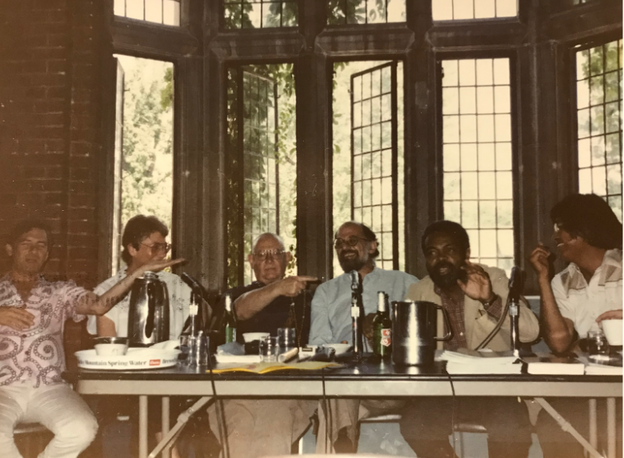Archival poetics at Naropa, part 2
Baraka at the American Poetry Archives

Steve Dickison, writer, teacher, and Director of the Poetry Center and American Poetry Archives at San Francisco State, manages a large collection of audio recordings dating back to 1954. He begins his contribution to the 2012 Naropa Summer Writing Program panel “Archival Poetics and the War on Memory” by discussing the difficulty of cataloging recordings so listeners don’t have to just “wade in unknowingly.”
Librarians and archivists know well the painstaking and time-consuming process of listening and relistening, cross-referencing to spell names and places correctly, researching to check references, and balancing these tasks with the desire to provide access to others in a timely fashion. And of course, audio recordings are not fully accessible to all until they have been fully transcribed.
Groetsema: Daydreaming Varieties of Audio Transcription:
- Hire a company to transcribe over three thousand audio files
- Hire a company to transcribe the top ten most listened to audio files
- Pay for a software program that transcribes audio with 99 percent accuracy
- Download an open-source software program to transcribe audio with varying degrees of accuracy
- Can one transcribe three thousand audio files using Microsoft Word Online?
- Ask the community to participate with limited infrastructure to share files
One company asks something like: “do you want to use Human Transcription or AI Transcription?” Human Transcription takes more time. Is it more accurate? Does the human get paid more? A question of ethics and labor.
Interestingly, one needs to purchase a subscription to Office 365 to use the transcribe function in Microsoft Office Online. One uploads an audio file and waits. The text, with timestamps, is added to a Word document and one can edit the textual information. Where do the audio files go and how long do they stay? Does transferring digital material from one storage area to another count as copying the file? If so, is it a reproduction? Is it a publication? If the thumbnail image of an image is considered, legally, to be a different thing than the image, what is the equivalent when considering an audio file? Who owns it?
In the meantime, someone emails the archive to request that their name be spelled correctly on the records in the Audio Archive database. And then later, during a class, a student responds that audio transcription of recorded lectures is akin to “archival surveillance.” The class agrees.
Rybin Koob: During his talk, Dickison reflects on a 1965 Poetry Center visit by LeRoi Jones, who had recently published his book Blues People: Negro Music in White America. Dickison describes and plays an excerpt from the recording of the event. The panel was hosted just eleven days after the assassination of Malcolm X, an event which LeRoi Jones cited as inspiration for changing his name to Amiri Baraka. Dickison wonders aloud whether the assassination and subsequent decision by Baraka are evidenced in the recording:
00:51:48: Where are world historic events recorded in the documents of our time?
Naropa audio engineering staff played the Poetry Center recording from 1965. Leading up to a critical moment, Richard Hadlock talks about Sidney Bechet as an artist, entertainer, and militant, but then comments:
00:56:50: He was one of the few who would not only remember the stories about his grandfather who was a slave, but write about them in a book with great pride … and he didn’t have to take the name X, because he was proud of his grandfather, whatever his name was.
And then nobody knows what to say. There’s a rustling and murmur in the room, and a move to end the panel on that note. Until John Handy speaks up to talk about the significance of taking on a new name and attests his allegiance to Malcolm X (and you can hear someone on Naropa’s audio engineering team say, turn it up …)
Handy talks about the relative importance of naming, then says:
00:59:00: Personally I don’t give a damn what I’m called, as long as it’s not a dirty name.
The mic picks up what LeRoi Jones says under his breath:
00:59:08: Negro is a dirty name.
Momentarily, Jones then defends Malcolm X’s pride in being black and points out that militarism isn’t new:
01:00:18: No man ever wanted to be a slave.
Is this the fact in the recording? As Dickison says, “listening is an intimate act.” After the 1965 recording ends, Dickison goes on:
01:02:00: … very interesting to listen to people listening to each other and speaking and to figure out, you know, how do we hear and receive this information that isn’t all available on the internet. Isn’t all, just, you know, at the tip of our fingers … and so, a lot of people are working to bring archives into our present conversation and um, I think it is all under the spirit of Mnemosyne, the mother of the muses, and the role of anamnesis — the unforgetting, or what Mahmoud Darwish in the translation by Ibrahim Muhawi, calls “memory for forgetfulness.”
Through this recording of a recording — a recording of a panel discussion where Dickison discusses and plays another recording of a panel discussion nearly fifty years ago — we can sense a possible seed for Baraka’s own decision to change his name. This experience, several times mediated, is palimpsest and interpretation, is archival poetics.
Groetsema: Turn it up
Community Praxis in Naropa Audio Archives